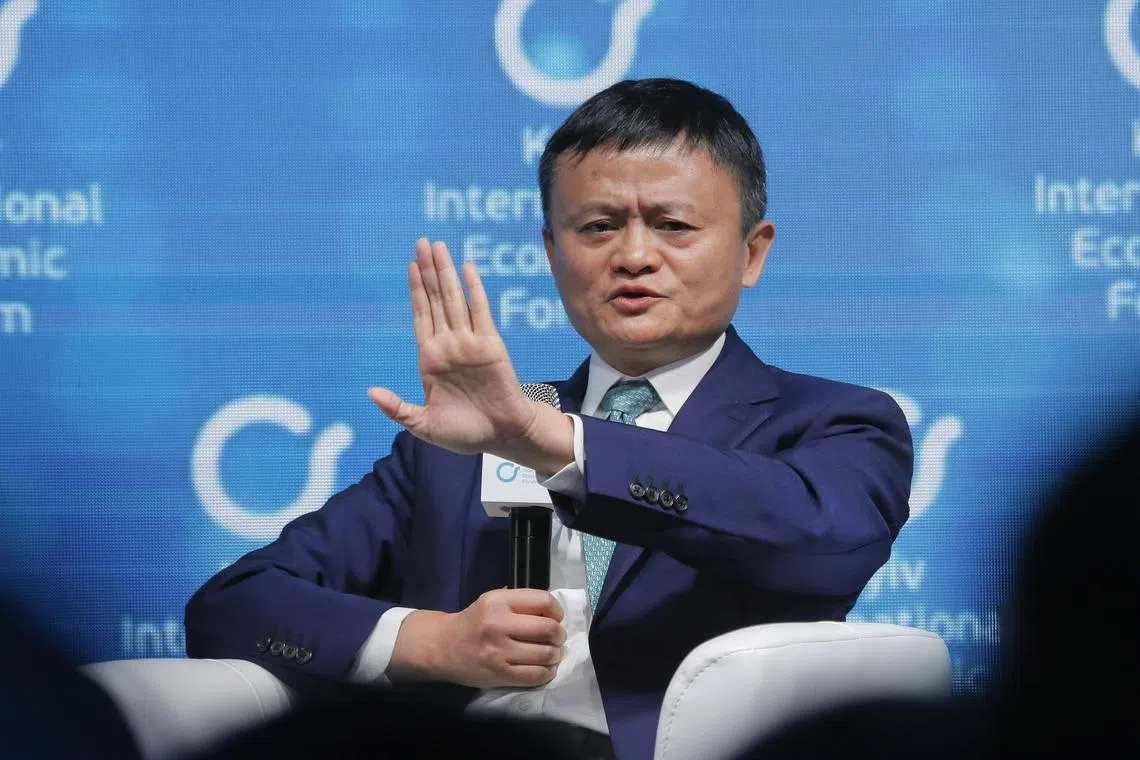What does Jack Ma giving up control of Ant mean for its IPO reboot?
Sign up now: Get ST's newsletters delivered to your inbox

The next big question is whether Ant will get another chance at going public, now that billionaire Jack Ma is ceding control.
PHOTO: EPA-EFE
HONG KONG – Over two years ago, Chinese regulators torpedoed Ant Group’s would-be record US$34.5 billion (S$46 billion) initial public offering (IPO), sending shock waves across global capital markets.
New rules have been slapped on the fintech giant, which has operations ranging from consumer lending to wealth management to online payments.
The result is that the once-fertile landscape for Web-based financial services has drastically changed as part of a government effort to bring the entire technology sector to heel.
The next big question for Ant is whether it will get another chance at going public, now that billionaire Jack Ma, China’s most-famous entrepreneur, is ceding control
1. What happened to Ma?
The co-founder of Alibaba Group Holding, from which Ant was spun off, used to be one of China’s most high-profile entrepreneurs and its richest.
He largely disappeared from public view
Last week, Ant said Mr Ma is giving up control and will hold about 6.2 per cent of voting rights after the adjustment.
Many of his peers have also relinquished their formal corporate roles and increased donations to charity to align with President Xi Jinping’s vision of achieving “common prosperity”.
2. How does Ma ceding control affect things?
It could prolong Ant’s listing timeline. Firms cannot list domestically on China’s so-called A-share market if they have had a change in control in the past three years – or in the past two years if listing on Shanghai’s Star market, which is geared towards new tech firms. For Hong Kong’s stock exchange, the waiting period is one year.
3. What would need to happen for Ant to go public?
The most important thing it needs is to set up a financial holding company, like a regular bank. Its application to the central bank for such a licence was said to be nearing the final stages back in June.
It would then need a sign-off from the China Securities Regulatory Commission (CSRC) to list in either Shanghai or Hong Kong (the scotched 2020 plan was to list in both cities simultaneously). While not officially part of the process, in reality, it would also need blessings from senior Chinese leaders and a wide range of government agencies.
4. What are regulators saying?
Signals have been mixed. Financial regulators have held preliminary talks on reviving an Ant IPO, according to people who spoke to Bloomberg News last year. One of them said the CSRC had set up a team to reassess Ant’s plans.
On June 9, Reuters reported that China’s central leadership had given an initial nod to restarting Ant’s listing plans in both Shanghai and Hong Kong.
The CSRC dampened hopes anything was imminent when it denied it was conducting review and research work on Ant’s IPO. But it added that it supported eligible platform firms going public in China and overseas.
5. What has Ant been doing?
Chairman Eric Jing has said that the company would eventually go public, but he said in 2022 that it had no plans to initiate an IPO yet. Ant reiterated that position in announcing Mr Ma’s ceding of control, saying it was focused on business rectification and optimisation.
Ant has been recasting its business to meet the demands of China’s watchdogs, which have pledged to curb the “reckless” push of tech companies into finance.
In April 2021, the central bank told Ant to open up its payments app to competitors and to sever “improper links” that steered users towards more lucrative services such as lending. Ant set up a consumer finance affiliate that went into operation that same year, with new rules that limit its ability to lend. Assets under management at Ant’s money market fund Yu’ebao – once the world’s largest – dropped about 36 per cent to 759 billion yuan (S$148.2 billion) as at September from two years ago.
6. What is Ant worth?
While Ant fetched a valuation of US$280 billion pre-IPO, based on its stock pricing, the myriad regulations imposed over the past two-plus years mean it is now worth a fraction of that, as it is now more “fin” than “tech”.
Expectations of growth and margin are generally lower for banks than tech companies.
Fidelity Investments, for example, cut its estimate for Ant to US$70 billion in 2022 from US$235 billion just before the IPO was suspended, while BlackRock lowered its estimate to US$151 billion.
7. What does all this signal more broadly?
The cancellation of Ant’s IPO kicked off a series of regulatory actions that have changed the playbook for the nation’s tech champions, which had prioritised growth at all costs.
Global markets whipsawed in reaction to Beijing’s evolving stance towards Big Tech in general and especially control over the vast pools of user data held by private sector firms that regulators viewed as a potential threat to national security. Some big banks went so far as to call Chinese tech stocks “uninvestable”.
But of late, the tone from Beijing has shifted. Regulators approved new game titles for Tencent Holdings after a long pause, and gave a nod for Ant’s consumer lending affiliate to increase its capital registration.
BLOOMBERG


